mainline Protestantism
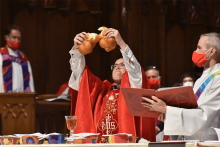
Rohrer’s resignation as bishop of the Evangelical Lutheran Church in America’s (ELCA) Sierra Pacific Synod, followed months of conflicts that destroyed reputations and livelihoods, permanently severed relationships, and left a church worshipping in a rainy parking lot. Sources within the ELCA told Sojourners that Rohrer’s resignation prompted sadness and denial, anger and celebration.
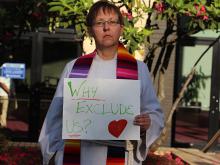
The Rev. Cynthia Meyer has been placed on an involuntary leave of absence after coming out as a lesbian earlier this year to her rural Kansas congregation.
The leave allows Meyer, a United Methodist minister, to avoid a church trial and comes after she met for more than 12 hours on Aug. 1 with those involved in a complaint against her, according to the denomination’s Great Plains Annual Conference.

While many evangelical church bodies have reiterated their “no” to homosexuality — and most mainline Protestant traditions have said “yes” — the United Methodist Church, which concluded its quadrennial meeting last week, remains as divided and muddled as ever.
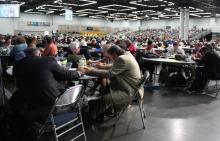
Amid protest, song, and fears of a denominational breakup, United Methodists at their quadrennial General Conference decided yet again not to decide anything regarding LGBT rights.
But in a groundbreaking move, the delegates from the U.S. and abroad voted 428-405 on May 18 to allow the church’s Council of Bishops to appoint a commission to discuss whether to accept same-sex marriage or ordain LGBT clergy.

The Church of Scotland will launch a two-year investigation into the possibility of introducing online baptisms, Communion, and other Christian sacraments.
The church, known as The Kirk, has seen its rolls fall by almost one-third between 2004 and 2015, to just under 364,000 members.

Delegates to the United Methodist Church General Conference shot down a strategy that would have allowed them to discuss contentious legislation in small groups.

To walk into First Congregational Church of Los Angeles on a Sunday morning is to see all the trappings of the mainline Protestant denominations pundits say are dying for lack of innovation, of relevance, of connection to the world outside church walls. There’s the robed pastor and choir, the 20,000-pipe organ playing the expected Bach interlude, the white-draped Communion table set with silver goblets, the well-thumbed pew Bibles, and the paper church bulletin being used as a fan by a couple of overly warm parishioners.

I spend (most of) my Sunday mornings sitting in a pew at an Evangelical Lutheran Church in America congregation, singing old hymns, and reciting the Lord’s Prayer which I have had memorized since before I went to school.
At age 22, I make an effort to get my dose of word and sacrament before heading to brunch on Sunday mornings. Though I love the beach, I found greater joy in singing songs and leading Bible studies at a mainline church camp during my recent summers.
I love the sound of an organ.
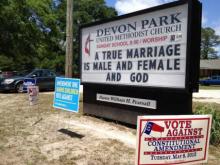
Will the United Methodist Church soon have to drop the “United” part of its name?
A group of 80 pastors is suggesting that the nation’s second-largest Protestant denomination is facing an imminent split because of an inability to resolve long-standing theological disputes about sexuality and church doctrine.
But more than lamenting the current divisions, the pastors indicated there is little reason to think reconciliation — or even peaceful coexistence — could be found. Like a couple heading to divorce court, the pastors cited “irreconcilable differences” that can’t be mended.
“We can no longer talk about schism as something that might happen in the future. Schism has already taken place in our connection,” said the Rev. Maxie Dunnam, a retired president of evangelical Asbury Theological Seminary in Kentucky, who joined the statement.

Pulitzer-Prize winning author Marilynne Robinson draws a wide fan base that spans lovers of serious literature, including many conservative Christians. This fall, she will release “Lila,” a follow-up to her earlier novels “Gilead” (2004) and “Home” (2008) about a 1950s-era Iowa town that won her many accolades.
Robinson’s diverse fan base was described in The American Conservative as “Christian, not Conservative.” As the author noted, Robinson is far from holding up ideals put forward by the religious right. But that doesn’t stop conservative Christians from engaging with her writing.
Before giving an address at Union Theological Seminary this spring, Robinson spoke to Religion News Service about a variety of social issues. In the interview, Robinson explained why she thinks Christians are fearful, why she loves theologian John Calvin and whether she’ll join Twitter.

Recently, Keith Anderson, my friend and co-author on Click 2 Save: The Digital Ministry Bible, wrote a post that’s been stirring a good deal of interest — and concern — across the blogosphere.
Anderson’s piece, “What Young Clergy Want You to Know,” has, I suspect, attracted so much attention because it dives right into the middle of the frustration, anxiety, and discouragement one increasingly finds among clergy of all ages and levels of experience, but that is amplified among younger clergy because they’ve made a vocational commitment to the Church at a time when such a choice seems crazier than ever.
This, as Anderson points out in the post, is because younger clergy “understand they are presiding over the death of American Christendom.”
Younger clergy, says Anderson, “are worried about job security — not just about getting paid (which is not always a given) — but whether they can do the job they feel called to do in congregations that don’t want to change.” He continues, “Being prophetic is an attribute we laud in seminary, but it can get you fired in the parish.”
Well, there you have it. The unvarnished truth of vocational experience in institutional contexts that over time wears out even the most patient, most tolerant, most enthusiastic of clergy. The wrenching responses to the post make clear that Anderson struck a nerve among his clergy colleagues.

The question now is whether these breakaway groups signal a seismic shift in American Protestantism, or just a few fissures in the theological terrain.
In some ways, the rifts are nothing new. American Protestants have been splintering since Roger Williams left Plymouth Colony in the 1630s, said Nancy Ammerman, a sociologist of religion at Boston University.
Yet the schisms counter a 20th-century trend in which ethnic and regional Protestant groups merged to form big-tent denominations such as the ELCA and PC(USA).
"What we may be experiencing at this point is the limit of that movement to draw a lot of diversity under one umbrella," said Ammerman, author of Pillars of Faith: American Congregations and Their Partners.
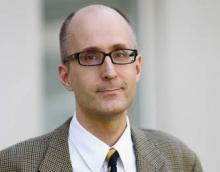
Every so often, evangelicals get the urge to ex-communicate. Feminists, open theists, and universalists have all drawn the ire of their co-religionists. In the absence of a central religious authority, such efforts are doomed to fail.
According to most scholars, evangelicalism is more of a network than a unified church. Magazines, publishing houses, colleges, and parachurch groups play a bigger role than ecclesial bodies. While condemned from many pulpits, the emerging church continues to publish with Zondervan and Baker. Owned by the same company as Zondervan and Fox News (Rupert Murdoch’s News Corporation), HarperOne has provided a home for Rob Bell and his Love Wins.
Though it hasn’t been easy, Bell has remained a part of American evangelicalism.
Fried by their battles with fellow believers, some have decided to ex-communicate themselves. Even then it is hard to cut the tie. As in the case of cultural Catholicism, religious terminology may haunt a post-evangelical’s speech. Commenting on this phenomenon, Tony Jones wonders whether evangelicalism is the “new Jewish" — more cultural than confessional.